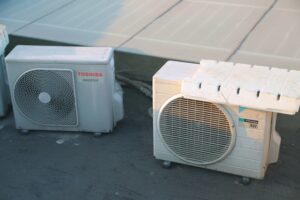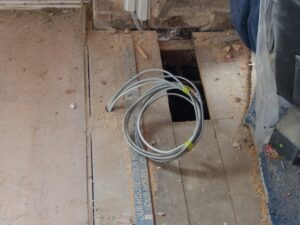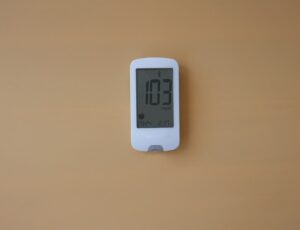Dealing with hot water that takes an unusually long time to heat up can be incredibly frustrating.
Whether it’s the morning rush or after a long day, waiting for hot water when you need it most isn’t ideal. But before you start panicking or calling for a repair, it’s important to know what could be causing the issue.
Most of the time, the culprit behind delayed hot water is either a buildup of sediment in your water heater or a malfunctioning thermostat. These common causes can lead to decreased efficiency, longer wait times, and even higher energy bills if not addressed.
The good news?
A bit of maintenance could make all the difference in improving performance and getting your hot water back on track.
Don’t worry – you don’t always have to rely on expensive repairs right away. Simple fixes like flushing your water heater or adjusting the thermostat might be all you need.
However, getting professional help from a trusted service like Excel Mechanical might be your best option if the issue persists. We specialize in HVAC and plumbing services to keep your systems running efficiently, ensuring you get the hot water you need when you need it.
In this blog, we will cover:
- The common causes of delayed hot water
- Step-by-step solutions you can try yourself
- When it’s time to call a professional for help
Ready to learn more about the possible causes of delayed hot water and how to fix them? Let’s dive in.
Overview of Hot Water Systems
Hot water systems are essential for everyday activities like bathing and cooking. Understanding the components and common types can help you choose the right system.
Components and Operation
A hot water system typically includes a heat source, a water tank, and various pipes and valves.
The heat source could be gas, electricity, or solar power. The tank stores and heats the water until it’s needed, and insulation in the tank helps maintain water temperature efficiently.
The system operates by using a thermostat to control the heat supply. When you turn on a tap, hot water flows from the tank, replaced by cold water that is subsequently heated. Pumps sometimes circulate hot water, ensuring it reaches faucets quickly.
Common Types of Hot Water Systems
Several types of hot water systems are available to suit different needs.
- Storage water heaters are the most conventional, storing heated water in a tank for use when needed.
- Tankless water heaters heat water on demand, providing a more energy-efficient option because they don’t keep a reservoir hot.
- Solar water heaters use solar panels to collect energy and heat water, which reduces energy bills and is environmentally friendly.
- Heat pump water heaters extract heat from the air to warm the water, making them another energy-efficient choice.
Investigating Delayed Hot Water
When hot water takes a long time to arrive, it can be inconvenient and frustrating. The key is to identify the cause and solve the problem. By checking systems and using an organized approach, you can usually fix the issue yourself or with expert help.
Initial Assessment
Start by assessing various components of your hot water system.
Check if the delay occurs at one tap or throughout the home, which can indicate different issues. The problem could be with the water heater itself if it’s all taps. If only one area is affected, there may be an issue with the piping or fixture.
Ensure your water heater is set to the correct temperature. A lower setting might cause longer wait times for hot water. Inspect the distance between the heater and the affected tap. Longer distances can naturally lead to delays.
Look for any visible leaks, which could affect time and efficiency. Listening to unusual noises from your water system can also offer clues. If this doesn’t identify the problem, more troubleshooting is necessary.
Troubleshooting Steps
- Begin by checking the thermostat settings on your water heater. If the temperature is set too low, adjusting to a higher temperature might solve the delay.
- Next, inspect the recirculation system, if present. A malfunction in this system might be causing the delay.
- Evaluate your water heater’s age. Older heaters may not perform well, leading to longer heating times.
- Flushing the tank to remove sediment build-up can enhance performance.
- Consider the pipe insulation. Poorly insulated pipes lose heat quickly, contributing to the problem. Adding insulation can help keep water warm as it moves through the pipes.
If these steps don’t resolve the issue, it’s wise to call Excel Mechanical for expert evaluation and service. Our skilled professionals provide excellent plumbing services tailored to your needs and budget. We are committed to delivering exceptional quality and value for residential and commercial systems.
Common Causes of Hot Water Delays
Experiencing delays in getting hot water can be frustrating. This issue often stems from several specific causes ranging from sediment build-up to malfunctioning thermostats or clogged pipes.
Sediment Build-Up in Water Heater
Sediment build-up in your water heater can drastically affect its performance.
Over time, minerals in water, like calcium and magnesium, settle at the bottom of the tank. This can insulate the water from the heating element, making it take longer to heat up.
Regular flushing of your water heater can help remove this sediment. It’s a good practice to do this once a year. If you experience consistent issues, you might need professional help.
Faulty Heating Elements
A faulty heating element in an electric water heater can also cause delays.
These elements are responsible for heating the water, and if they fail, the water might only reach lukewarm temperatures or take a long time to heat.
Testing the heating element with a multimeter can diagnose the issue. If the element is defective, it will need replacement.
Malfunctioning Thermostats
Thermostats regulate the temperature of your water heater.
If they malfunction, they can send incorrect signals, causing the heater to heat water to incorrect temperatures or take a long time to reach the desired temperature.
Checking your thermostat settings can sometimes reveal problems. A professional inspection might be needed if straightforward troubleshooting doesn’t fix it.
Our team is known for providing exceptional service, ensuring each part of your system functions perfectly for dependable hot water access.
Clogged Pipes or Aerators
Clogged pipes or faucet aerators can also contribute to delays.
Over time, mineral deposits and debris can restrict water flow, slowing down hot water delivery across your home.
Cleaning your aerators or using water softeners can help prevent clogs. For pipes, it might be necessary to have a plumbing professional inspect and clear any major blockages. Experienced plumbers can deliver excellent value, offering solutions tailored to your home’s needs and budget.
Maintenance Strategies
Regular water heater maintenance can prevent long delays in getting hot water. It involves routine inspections, flushing techniques, and timely parts replacement to ensure efficiency and longevity.
Regular Inspection and Care
To keep your water heater running efficiently, perform regular inspections.
Check for leaks, rust, or unusual noises. These could indicate underlying issues that might slow down heating. Make sure the thermostat is set correctly. Listen for any strange sounds from the water heater, as these could signal problems with the heating element or other components.
Keeping an eye on these signs can help address problems before they become severe. Routine check-ups by experts can be invaluable due to our professionalism and experience in residential and commercial HVAC services.
Water Heater Flushing Techniques
Flushing your water heater is essential to remove sediment buildup, which can affect heating efficiency.
Begin by turning off the heater and water supply. Attach a garden hose to the drain valve and lead the other end outside or to a bucket. Open the valve and allow the tank to drain fully.
Sediment reduces efficiency and can increase energy bills. Flushing should be done annually to keep your system running smoothly.
Replacing Parts
Parts like the heating element or anode rod may wear out and require replacement over time.
These components could be the issue if hot water takes longer than usual. An anode rod protects the tank from rust while the heating element warms the water. Regular checks can reveal when these need changes.
Replace any faulty parts to avoid further complications or costs. Quality replacements ensure long-lasting performance. Contact trusted professionals who understand your needs and provide high-quality services, ensuring your equipment performs optimally.
Energy Efficiency Considerations
Enhancing the energy efficiency of your water heating system can help reduce energy bills and improve overall performance. A few strategies that focus on upgrading equipment and utilizing insulation can be considered.
Improving Water Heating Efficiency
Assess your water heater’s age and performance to boost its efficiency. Older models use more energy, so investing in a newer, more efficient model can lower costs.
Regular maintenance, like flushing the tank to remove sediment, improves function. Setting the thermostat to a moderate heating level, around 120°F, can further conserve energy without compromising comfort.
Insulating Hot Water Pipes
Insulating your hot water pipes is a straightforward method to improve energy efficiency.
Proper insulation reduces heat loss as water travels from the heater to your tap. Foam pipe insulation is affordable and easy to install. It helps maintain water temperature, reducing the need for reheating.
Additionally, insulated pipes can lower the chances of freezing in colder months.
Upgrading to a Tankless System
A tankless water heater provides hot water on demand, using energy only when needed. This feature makes tankless systems more efficient compared to traditional storage heaters.
Installation might have a higher upfront cost, but the long-term savings on energy bills can be substantial. Tankless systems save space and offer a continuous supply of hot water.
When considering a switch, consider household size and hot water usage. Expert advice from trusted professionals can help determine if a tankless system meets your home’s requirements.
Professional Assessment and Repair
Sometimes fixing hot water issues requires professional intervention.
Knowing when to seek expert help and what to expect can save you time and ensure your system functions efficiently. Choosing a reliable service is crucial for long-term satisfaction.
When to Call a Professional
If hot water takes unusually long to heat, it might be time to call a professional.
Signs like fluctuating water temperatures, unfamiliar noises, or leaking pipes indicate possible issues with the system. Minor DIY checks might overlook hidden problems, leading to a bigger repair later.
Acting fast can prevent major damage. Trained experts can diagnose issues accurately, saving you both time and cost. If repairs are needed, parts replacement or adjustments can be handled efficiently.
What to Expect During a Professional Service Call
During a service call, a technician thoroughly inspects your heating system. They will assess various elements, such as the thermostat and heating elements, and any signs of corrosion or wear. Identifying the exact issue is crucial for effective repair.
Professionals will then discuss their findings and recommend the best course of action. Based on your needs and budget, they might suggest repairs, replacements, or system upgrades.
Transparency and clear communication are key to understanding the steps and costs involved.
Long-Term Solutions
Several long-term solutions can be implemented to address the issue of hot water taking a long time. These include upgrading your system and exploring alternative energy options for efficiency.
System Upgrades and Replacements
Upgrading or replacing your water heating system can significantly improve hot water delivery times.
Consider installing a tankless water heater, which provides hot water on demand and reduces wait times. Another option is a heat pump water heater, which is energy-efficient and works well in different climates.
Regular maintenance is crucial. Ensure your system is serviced by professionals like Excel Mechanical for optimal performance. We offer services that suit residential and commercial needs, providing exceptional quality and value.
Regular checks of your current system can also prevent unexpected delays in hot water delivery.
Renewable Energy Alternatives
Switching to renewable energy sources can enhance water heating efficiency and reduce energy costs.
For example, solar water heaters use solar panels to heat your water, which is both sustainable and cost-efficient in the long run. They are especially beneficial in regions with lots of sunlight.
If you prefer a diverse energy approach, consider geothermal systems. These systems draw heat from the ground and can be a reliable option.
At Excel Mechanical, we tailor these systems to your needs and budget to ensure excellent performance and sustainability for your home or business.
Frequently Asked Questions
We all know how annoying it is when hot water takes forever to reach the tap. You’re already late for work, and now you’re standing there, waiting for that hot water to finally show up. But don’t worry! Let’s tackle some of the most common questions people ask about delayed hot water – and, more importantly, what you can do about it.
What could be causing a delay in the arrival of hot water to the taps?
Several factors can cause a delay. Pipe length and diameter play roles, as well as the age and efficiency of your water heater. A faulty thermostat or sediment build-up in the tank may also contribute to slow heating.
Are there common issues that lead to slow hot water in winter months?
During winter, pipes can lose heat quickly, which delays hot water flow. Cold air can affect your water heater’s efficiency. Insulating your pipes might help retain heat, improving how quickly hot water reaches your taps.
How might one reduce the time it takes for hot water to reach the shower?
Installing a hot water recirculating pump can significantly reduce wait times. This system keeps hot water circulating through pipes, giving instant hot water in the shower. Insulating pipes and ensuring the heater is in good working order also helps.
What steps can be taken to troubleshoot a water heater delivering hot water slowly?
Checking for sediment build-up in the tank can be a starting point. Flushing the system might resolve this. Inspect the thermostat settings and ensure they are correct. Regular maintenance by professionals can prevent many of these issues.
Could a hot water recirculating pump solve issues with delayed hot water?
Yes, a recirculating pump can be a solution. It helps maintain hot water in the pipes, reducing wait times. This not only saves time but also conserves water. Consulting experts with real knowledge can ensure you choose the right setup for your home.
What are the potential fixes for a water heater that takes too long to heat up?
Regular maintenance, like descaling to remove sediment, can improve efficiency. Replacing an old thermostat or upgrading to a more efficient water heater might solve persistent issues. Seeking advice from Excel Mechanical can help you select the best solution based on your needs.




